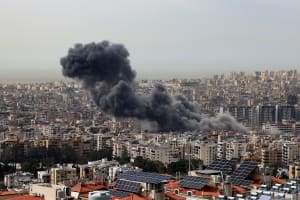Headed into another crisis? Relations between Egypt and Israel are being tested like never before
Egypt warns that peace deal is in danger over IDF’s Rafah plans

In the wake of the war between Israel and the Hamas terrorists in the Gaza Strip, neighborly relations between the State of Israel and the Arab Republic of Egypt – once thought to be rock-solid – are now headed into a crisis.
Numerous news reports in recent weeks have documented the deterioration of relations, seemingly connected to the war in Gaza. However, the roots can be traced further back, giving cause for serious concern.
There are two important differences of opinion between the two nations: Israel’s plans to take over the Philadelphi Corridor on Gaza's southern border with Egypt, and the prospect of an Israeli advance on the adjacent town of Rafah.
Rafah is the last major town that hasn’t been targeted by the advancing IDF troops so far and as such, is the Hamas terrorists’ last standing stronghold. The town is also flooded with civilian refugees who fled there from the IDF’s advance.
Ostensibly, Egypt’s largest concern is that Israeli actions could create panic among the hundreds of thousands of Gazans who fled to Rafah, which could cause increasing pressure on Egypt’s border or even its storming, with thousands of refugees spilling into the Egyptian Sinai peninsula.
These concerns are in addition to a smaller controversy caused by Israel arguing at the ICJ that Egypt was responsible for holding up humanitarian aid transfers into Gaza, which reportedly nearly caused Egypt to recall its ambassador in protest.
The current Egyptian government, led by former General Abdel Fattah el-Sisi, fears nothing more than an influx of Hamas-affiliated masses from Gaza.
The Muslim Brotherhood ideology that gave rise to Hamas has been the most constant domestic danger to Egyptian governments since the declaration of the Egyptian Republic in 1953.
El-Sisi himself assumed control in a military coup against a Muslim Brotherhood government that was democratically elected in the wake of the Arab Spring in 2011.
To prevent this scenario, Egypt has further strengthened its already formidable border bulwark that was created some years ago in an initiative to close down the extensive smuggling network that connects Gaza with the Sinai Peninsula.
Here, Egypt's rejection of Israel's plans to retake the Philadelphi Corridor comes into play.
Despite ostensible Egyptian efforts to control the border, and its intensive security cooperation with Israel, Hamas has continued in recent years to smuggle massive amounts of weapons and matériel into Gaza.
Egypt has denied such accusations using unusually hostile language. According to a recent report from Israel’s Channel 14 news, Egyptian officials stated: “Israel’s claims about smuggling using trucks carrying goods to the Gaza Strip… empty and ridiculous and … intended to justify the continued collective punishment, killing, and starvation of more than 2 million Palestinians.”
This leaves several options as to how this could have happened, despite the claimed efforts to clamp down on smuggling.
Either Egypt’s army failed, through incompetence or corruption; perhaps it just turned a blind eye and ignored the issue over the years; or maybe factions in the army or the government actively cooperated with the smuggling operation.
If the Israeli army takes over the corridor, as Prime Minister Benjamin Netanyahu has publicly and repeatedly vowed to do, the Egyptian failures could become public and embarrass the regime.
Despite the existing peace treaty and good relations at the security and political levels, Egyptian society isn’t friendly toward Israel in the least, as recent events have shown.
What makes this precarious situation worse is that Israel is in a uniquely bad strategic situation following the horror and embarrassment of Oct. 7. The surprise invasion by thousands of Hamas terrorists at the Gaza border revealed Israeli weakness in the eyes of its enemies.
Its once-vaunted armed forces were completely overwhelmed by an invasion on just one of its borders, which was thought to be the most secure of all –Israel’s regional deterrence is shot.
The deterioration of Israel’s relationship with Egypt has the potential to substantially worsen the strategic situation even further.
If Egypt cancels the 1979 peace agreement over an incident on the Gaza border, Israel’s border with Egypt could, overnight, turn into its most dangerous problem zone.
El-Sisi has transformed his country’s military into one of the region’s most powerful armies – and Israel hasn’t been preparing itself for a showdown with it for decades.
The Egyptian armed forces, already one of the region’s largest militaries, are in the middle of an enormous acquisition spree and an accompanying buildup of infrastructure such as bases, highways, and bridges, all pointing east toward Israel.
Israeli retired Lt.-Col. Eli Dekel has been warning against this growing threat for years. He served in the IDF Military Intelligence’s Research Department, specializing in recognizing military and civilian infrastructure and its implications.
According to Dekel, Egypt’s military has added some 60,000 soldiers since el-Sisi came to power, with its alignment being against only one enemy: Israel.
Egypt has volatile borders with Libya, Sudan, and a potentially life-threatening dispute over the Nile’s water rights with Ethiopia in the south. Despite this, Dekel’s research shows that only three out of the Egyptian army’s 16 divisions are stationed west or south of Cairo.
The rest are based east of the capital, toward the Sinai and the Israeli border.
Moreover, Israel enabled a large build-up of forces near its border when Egypt was fighting the ISIS forces in Sinai, allowing more Egyptian troops into the Sinai than was originally agreed upon in the peace treaty of 1979.
In addition, Egypt has built a massive network of roads and bridges, created dozens of opportunities to cross the Suez Canal, and acquired hundreds of tank transporters, enabling it to rapidly reinforce troops in the Sinai Peninsula.
In the event that Egypt’s leadership sees itself forced to cancel the peace treaty, it could leverage its newly hostile position against Israel to lower the domestic pressures from Islamist forces and attempt to reassert itself as the leading Arab power in the region, Dekel warns.
Further complicating the situation for Israel and the United States, Egypt could choose to deepen its incremental alignment with the anti-Western Axis currently forming under Russian and Chinese leadership.
It already joined the explicitly anti-Western economic alliance BRICS, together with Russia, China, Iran, and South Africa; it is becoming reliant on the import of tons of Russian wheat; and part of its military buildup has been sourced from Russia, instead of its main military supplier in recent decades, the United States.
If Israel should learn one lesson from recent disasters, it is this: Israel cannot be blinded by peace treaties, international accords, and false notions of deterrence, even on borders that have been quiet in recent years.
Israel Defense Forces must always be ready for the worst scenario, on any border and against any potential threat, as unlikely as it may seem at the moment.

Hanan Lischinsky has a Master’s degree in Middle East & Israel studies from Heidelberg University in Germany, where he spent part of his childhood and youth. He finished High School in Jerusalem and served in the IDF’s Intelligence Corps. Hanan and his wife live near Jerusalem, and he joined ALL ISRAEL NEWS in August 2023.













